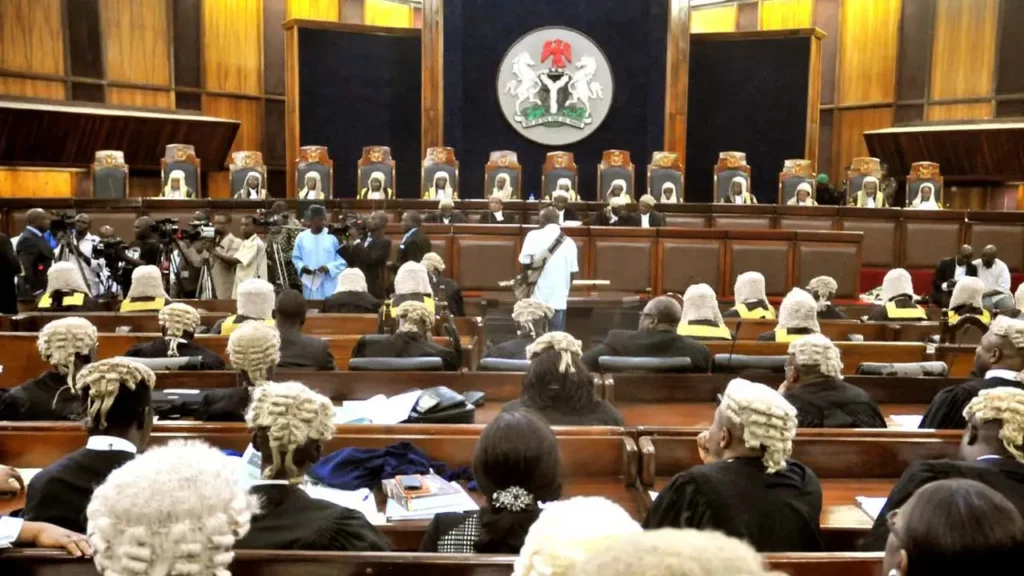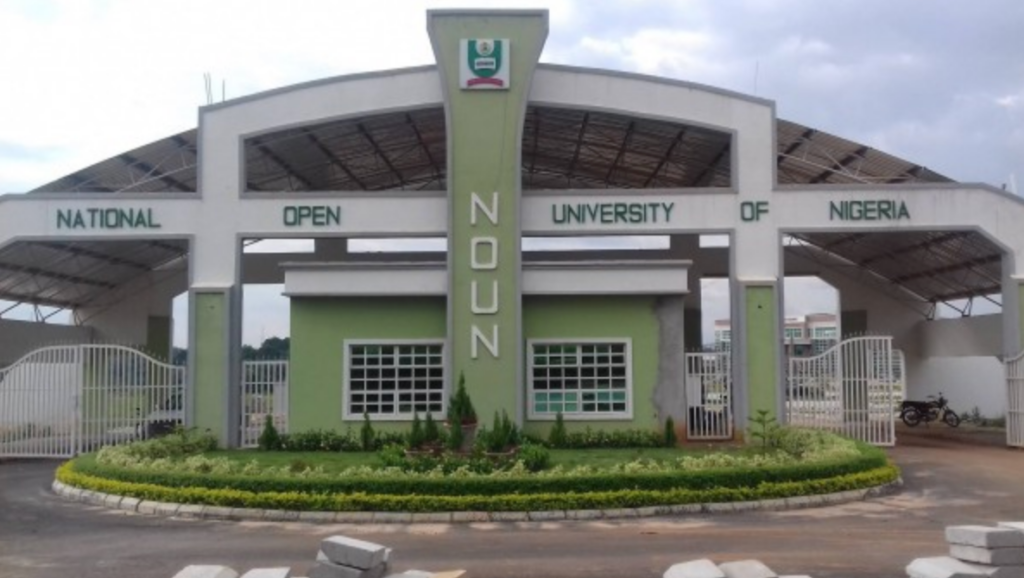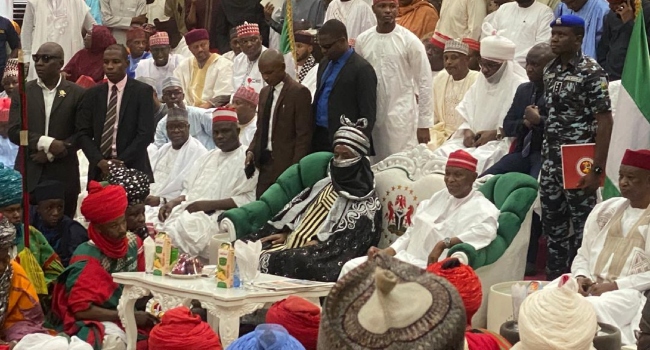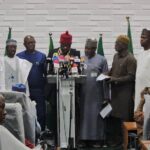 • Says Lower Court Turned Law And Natural Justice Upside Down
• Says Lower Court Turned Law And Natural Justice Upside Down
• Govs Sanwo-Olu, Nwifuru, Otti, Otu, Mohammed Also Win
It was sweet victories for the Governors of Kano State, Yusuf Abba Kabiru; Plateau State, Mr. Caleb Mutfwang; and Zamfara State, Dauda Lawal, whose victories at the March 18, 2023 governorship election was affirmed by the Supreme Court, yesterday, following their appeal against their earlier sack by the Court of Appeal.
The Supreme Court also declared the Lagos State Governor, Babajide Sanwo-Olu and his counterparts in Bauchi, Abia, Ebonyi and Cross Rivers states, Bala Mohammed, Alex Otti, Francis Nwifuru and Bassey Otu, respectively, as validly elected by the electorate, thereby, quashing the hopes of the opposition to upturn their victories.
There was heavy security in, and around the Supreme Court of Nigeria complex in the three arms zones of Abuja, as the pronouncements were made by the revered Justices.
The Guardian observed that security operatives from regular and plain-clothed police units were deployed to the Court’s main entrance to block unauthorised movements of humans and vehicles into the complex.
Present in the court yesterday were four governors: Bala Mohammed of Bauchi State, Abba Yusuf of Kano State, Caleb Mutfwang of Plateau State, and Dauda Lawal of Zamfara State.
Also in court was the immediate past Governor of Plateau State, Senator Simon Lalong.
The panel of justices of the Supreme Court walked into the court at exactly 9:27am to commence delivery of judgments.
Affirming Yusuf of the New Nigeria People’s Party (NNPP) as the duly elected governor of Kano State, the Supreme Court dismissed the petition instituted against him by the by All Progressives Congress (APC) and its governorship candidate, Nasir Yusuf Gawuna.
The apex court reversed the judgments of the Court of Appeal and the Kano State Governorship Election Petitions Tribunal, which had nullified the election of the governor, describing them as miscarriage of justice.
Justice John Inyang Okoro, who delivered the lead judgment, held that the law and natural justice were turned upside down by the two courts below to arrive at the unjust and unfair decision.
Justice Okoro, while voiding and setting aside judgments of the two lower courts, said that miscarriage of justice in the ways and manners the petition against the governor was handled was manifest.
The Court of Appeal and the Tribunal had in their concurrent judgments annulled the election of Yusuf and declared Gawuna as winner of the election.
However, the Supreme Court held that two major fundamental flaws were discovered in the findings of the Tribunal and the Court of Appeal, which led to miscarriage of justice.
Justice Okoro said that the allegations of the APC that the governor was not a member of the NNPP at the time he stood for the election and which the Tribunal used to overturn his victory is against the provisions of the law.
The Supreme Court held that membership of the NNPP by the governor cannot be challenged by APC on the ground of being internal affairs of the party.
Justice Okoro also held that the issue of party membership cannot be raised as a post election matter as done by the APC and its governorship candidate; and wrongly upheld by the Tribunal and the Court of Appeal.
The Supreme Court found that the governor’s nomination was submitted to the Independent National Electoral Commission (INEC) in an NNPP letter head paper jointly signed by the party’ national chairman and national secretary.
Justice Okoro also held that since the nomination, no member of the NNPP had queried the action except the APC in its petition before the Governorship Election Petition Tribunal.
Besides, the Supreme Court reversed the unlawful removal of 165, 616 votes from the total votes cast for the NNPP and its governorship candidate at the poll.
The court said that there was no basis for the unlawful removal of the votes from the governor’s votes because the ballot papers used for the poll were duly issued by the Independent National Electoral Commission (INEC).
It dismissed the allegations that the ballot papers were not signed and stamped at the back.
Justice Okoro said there was no scintilla of evidence from any witness or documentary exhibits that the ballot papers were illegal and unlawful as erroneously concluded by the Court of Appeal.
The Supreme Court, therefore, agreed with the governor that miscarriage of justice was perpetrated against him in the ways and manners his election was nullified.
Justice Okoro ordered that the 165, 616 votes unlawfully deducted from the governor be returned to him.
The Supreme Court, while allowing the appeal of the governor and the NNPP, dismissed the two judgments earlier granted in favour of the APC and its governorship candidate on the ground that the judgments were erroneously entered in their favour.
In the Zamfara State governorship case, the Supreme Court overturned the decision of the lower court and affirmed the election of Governor Dauda Lawal.
Reading the judgment on behalf of the panel, Justice Emmanuel Agim held that the Court of Appeal decision was perverse and cannot stand.
The Court of Appeal had sacked Lawal of the PDP and ordered INEC to conduct fresh elections in Maradun Local Council, in four wards in Birnin Magaji Local Council and some polling units in Bukkuyum Local Council.
Justice Sybil Nwaka-Gbagi, who read the Court of Appeal judgment, had said INEC should not have used IReV for the collation of results when the Supreme Court had ruled that it is not a result collation system but only for public viewing.
The three-man panel of justices upheld four out of seven issues brought forward by the candidate of the APC, Bello Matawalle.
However, the Supreme Court in its judgment, yesterday, specifically said the decision of the Appeal Court ordering INEC to conduct elections in some local councils has no evidential merit.
It specifically held that the decision of the Court of Appeal to set aside some local councils has no evidential merit and consequently set it aside with no order as to cost.
In the Plateau State governorship case, the Supreme Court reversed the judgment of the Court of Appeal, which in November last year removed Governor Caleb Mutfwang of Plateau State from office on grounds of unlawful nomination.
The Supreme Court held that the Court of Appeal made fundamental error in allowing the APC to poke nose into the conduct of the primary election by the PDP and nullified the election unjustly.
Justice Emmanuel Akomaye Agim, who delivered the lead of the unanimous judgment, said the issue of primary election was an internal affair of political parties and that no other party can dabble into it except members of the same party.
Besides, Justice Agim said the issue of alleged improper conduct of the ward and local council election used to sack the governor was not justiceable.
He said that the conduct of the ward and local council elections was an affair of the State Executive Committee of a political party while the conduct of the primary election for the nomination of a governorship candidate is entirely that of the National Executive Committee of a political party.
Justice Agim held that there was no issue of irregularities in the ways and manners the governorship primary election that produced the governor was conducted in Plateau and wondered why that of the ward election was used to nullify the gubernatorial poll.
He said that evidence was even well adduced that an order of Plateau State High Court allegedly disobeyed was indeed obeyed by parties involved.
Justice Agim, therefore, voided and set aside the order of the Court of Appeal that Nentawe Goshwehe, the governorship candidate of the APC, be inaugurated as Plateau State governor.
The Supreme Court, therefore, affirmed the judgment of the Plateau State Governorship Election Petitions Tribunal, which had earlier dismissed the petition of the APC and its governorship candidate.
On the appeal by the governorship candidate of the Labour Party ( LP), Gbadebo Rhodes-Vivour, and his PDP counterpart , Azeez Adediran, against the election of Sanwo-Olu as Lagos State Governor, Justice Mohammed Lawal Garba, who read the judgment on behalf of a five-man Panel of Justices, held that the petitions lacked merit and accordingly dismissed them. Recall that Rhodes-Vivour and Adeniran had filed separate appeals against the judgments of the Court of Appeal, which affirmed the two decisions of the Governorship Election Petition Tribunal in the state.
The tribunal had dismissed the petitions of Rhodes-Vivour and Adeniran challenging Sanwo-Olu’s victory in the governorship election, a decision the duo appealed up to the Supreme Court.
A five-member panel of Supreme Court Justices headed by Justice John Okoro dismissed the two appeals and affirmed the declaration of Sanwo-Olu as the governor of Lagos State.
The court said parties should bear their respective costs.
On the Bauchi State governorship case, the Supreme Court affirmed the election of Governor Bala Mohammed of the PDP as winner of the governorship election.
Justice Mohammed Musa Saulawa, who read the lead judgment, dismissed the application of Sadique Abubakar of the APC challenging the decision of lower court that affirmed Mohammed’s victory.
The Court of Appeal had in its judgment delivered in November affirmed the victory of Mohammed in the Bauchi governorship election. A three-man panel of justices of the appellate court was unanimous, awarding no cost as the court held that each party to the matter should bear their costs.
One of the appellant’s pleas was that the election should be nullified, alleging that the forms and booklets used in the election were not properly filled.
However, the Appeal Court ruled that the appellant failed to prove this allegation with the necessary evidence.
On Ebonyi governorship election dispute, Justice Abubakar Tijani, who read the judgment on behalf of the panel members, stated that “the appeal is unmeritorious and it is hereby dismissed.”
The Supreme Court held that the appellant failed to successfully establish a case of non-compliance and, therefore, his case cannot succeed.
The Supreme Court, in a unanimous agreement, upheld the decision of the Court of Appeal, Lagos, which had earlier affirmed Francis Nwifuru as the duly elected governor of Ebonyi State.
In a unanimous decision, a three-member panel of the Court of Appeal led by Justice Jummai Sankey, had dismissed the appeal filed by Chukwuma Odii of the PDP.
The panel also resolved all the five issues raised against the appellant and dismissed the appeal for lacking in merit.
Justice Sankey held that the PDP and its candidate lacked the legal right to meddle in the internal affairs of the APC as it relates to the nomination of candidates.
On the Abia governorship election dispute, Justice Uwani Abba-Aji, while delivering judgment, dismissed both the petitions of the PDP and APC candidates against the Labour Party candidate for lacking in merit.
It will be recalled that Governor Alex Otti of the LP was declared the winner of the governorship election in Abia State by INEC. He polled 175,466 votes to defeat his closest rival, Okey Ahiwe, of the PDP, who scored 88,529 votes.
Ahiwe and the governorship candidate of the APC, Ikechi Emenike, separately challenged Otti’s victory at the tribunal.
The tribunal, in its judgment on October 6, 2023, dismissed the petitions by Ahiwe and Emenike and affirmed Otti’s election. The judgment of the tribunal was later affirmed by the Court of Appeal but Ahiwe and Emenike approached the Supreme Court to seek redress.
However, the Supreme Court in its judgment yesterday said that there was no proof of substantial non-compliance as claimed by the PDP in the petition against the Labour Party and its governorship candidate and therefore dismissed the appeal.
On the Cross River State governorship dispute, Justice Helen Ogunwumiji, who read the judgment of the Supreme Court, dismissed the petition for being incompetent.
The PDP and its governorship candidate, Senator Sandy Onor, had challenged the nomination of Governor Bassey Otu by his party, the APC.
Onor had approached both the tribunal and appellate court, insisting that Otu should be disqualified from the race for allegedly holding dual citizenship, committing certificate forgery and for not being a member of the APC as of the time of the election.
But the lower courts dismissed the PDP petitions, agreeing with Otu’s submission that the PDP cannot challenge his victory on grounds of party sponsorship and nomination because they were not aspirants during the APC governorship primaries.
The Court of Appeal, Calabar Judicial Division, had dismissed the appeal filed by the PDP governorship candidate and Onor against Otu.
Justice Ogunwumiju in the judgment, yesterday, said the appellant was unable to prove the case of forgery and non-qualification against the respondent.
The Supreme Court also held that the issue of non qualification raised by appellant was a pre- election matter and consequently dismissed the petition for lack of merit as it was out of judicial time.













